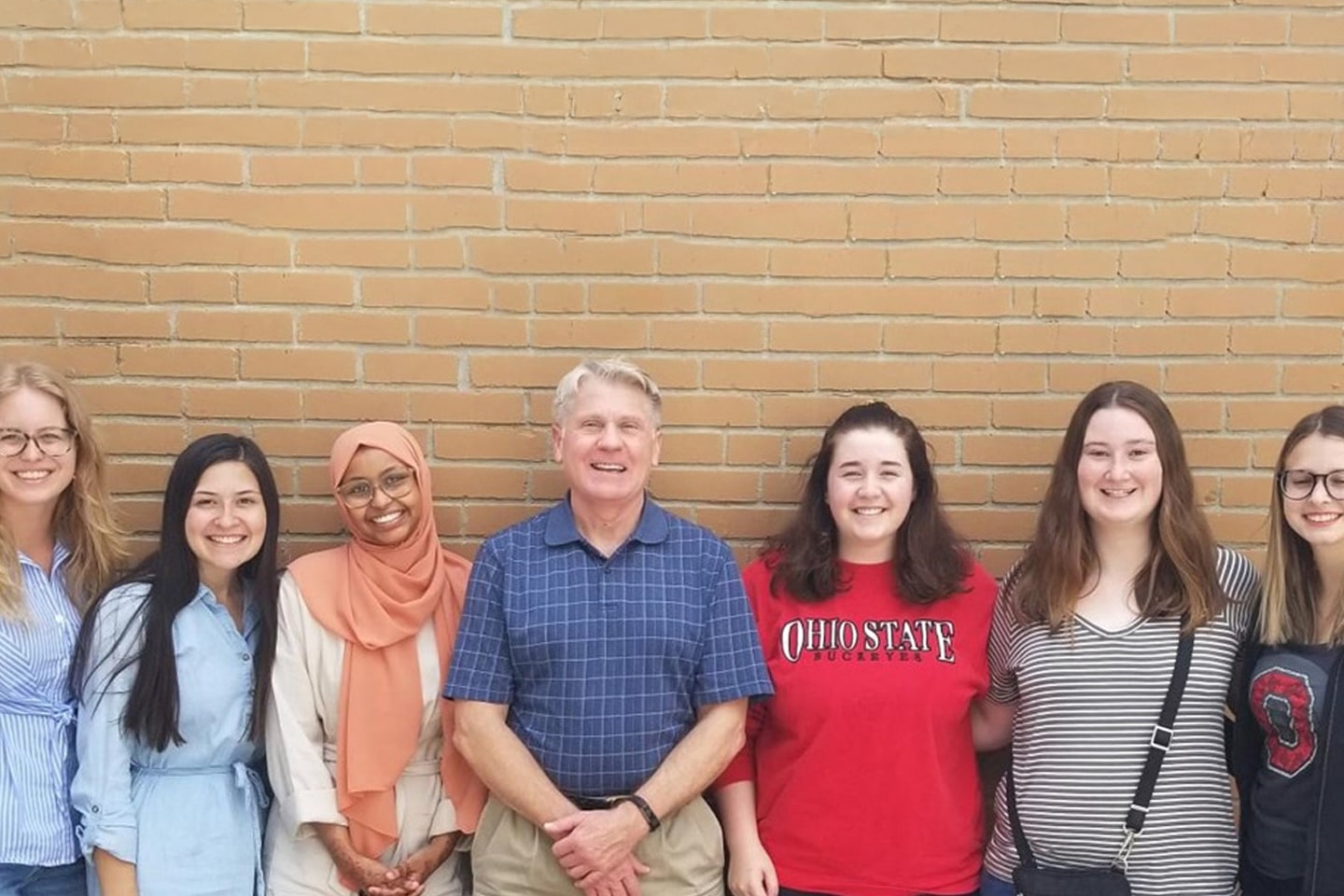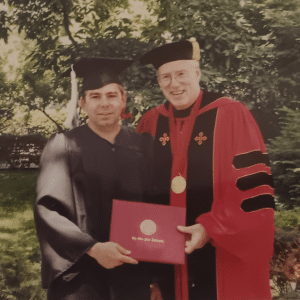Bachelor of Science in Human Development and Family Science

March 1, 2026
May 11, 2026
Overview
The Ohio State University’s online Bachelor of Science in Human Development and Family Science (HDFS) offers a unique opportunity to explore how people grow, thrive, and navigate life’s challenges. Rooted in psychology, sociology, and human ecology, this flexible and transfer-friendly degree prepares you to make a meaningful impact in human services, education, health-related fields, and beyond.
Designed for students with previous college credit, this 100% online program empowers you to build a strong foundation for a career helping others or to continue your education in graduate or advanced study. With the support of dedicated faculty and staff, you’ll gain the knowledge and skills to improve lives across the lifespan.
Please note: A minimum of 30 post-high-school semester hours (45 quarter hours) is required for admission into the online Bachelor of Science in Human Development and Family Science program.
Why choose Ohio State’s online Human Development and Family Science degree?
- Customize your pathway – With a wide range of elective options, you can tailor your degree to fit your academic background, interests, and career goals, or prepare for graduate and advanced study.
- Top-ranking program – The BS in Human Development and Family Science program is among Ohio State’s online bachelor’s programs ranked No. 4 in the country by U.S. News & World Report.
- A degree that fits your life – 100% online, mostly asynchronous courses let you balance your education with work, family, and other commitments.
- Transfer-credit friendly – Build upon what you’ve already accomplished by transferring eligible credits from your associate degree or prior coursework, helping you save time and tuition as you complete your bachelor’s degree.
- Support from start to finish – Receive personalized guidance from expert faculty, your enrollment advisor, and a student support specialist, ensuring you feel understood, challenged, and supported throughout your academic journey.
- A proven program, now online – Backed by over 45 years of excellence, this established program has evolved to meet the needs of today’s learners. Now offered in a flexible online format, it continues its legacy of preparing students for success.

No. 4 in the country
Ohio State’s online bachelor’s programs are ranked No. 4 in the country by U.S. News & World Report.
Frequently Asked Questions
Human development and family science is an interdisciplinary field that explores how people grow, learn, and navigate challenges across all stages of life. By integrating psychology, sociology, education, and more, you’ll learn how individuals, families, communities, and environments develop — and how this knowledge can be used to improve lives through work in education, human services, and related fields.
Ohio State’s Bachelor of Science in Human Development and Family Science is a 120-credit-hour program. To get started with the online program, you’ll need at least 30 college credits, and you can apply up to 90 previously earned credits, such as those from an associate degree, toward your total. Your time to graduation depends on how many eligible credits you bring in and how many courses you take each semester. Most part-time students take about 6 credit hours per term, while full-time students typically take 12.
A human development and family science degree prepares you for a broad range of careers in areas like education, health, human services, and beyond — fields centered on supporting individuals, families, and communities. It’s also a great pathway to graduate studies. Learn more about potential career outcomes.
Ohio State HDFS graduates have gone on to work at organizations such as Nationwide Children’s Hospital, Girl Scouts of America, Make-A-Wish Foundation, and a variety of schools, community agencies, and nonprofits. Explore more HDFS graduate careers here.
Yes. The program is 100% online, with most courses offered asynchronously, so you can complete coursework and watch lectures when it fits your schedule. You’ll also have flexible pacing options and supportive faculty who understand the demands of work, school, and life.
We welcome students from a wide range of academic backgrounds! You’ll need a minimum of 30 post-high-school semester hours (or 45 quarter hours), and we’ll work with you to determine how your previous credits can apply toward your degree. If you’re just getting started with your higher education journey, consider our online Associate of Arts in Early Childhood Development and Education or Associate of Arts in General Studies programs, which can be applied towards your bachelor’s degree.
Yes, you can transfer credits from your associate degree into the online HDFS bachelor’s program, based on eligibility. Transfer credit eligibility is determined upon review of official transcripts. Students must complete at least 30 credit hours through the HDFS program.
Some of the learning outcomes of the Bachelor of Science in Human Development and Family Science include understanding how family, community, biological, and societal factors influence people across the lifespan; applying research and theory to real-world challenges; designing evidence-based interventions to support individuals and families; and analyzing and interpreting quantitative and qualitative HDFS data.
No, Ohio State’s Bachelor of Science in Human Development and Family Science can be completed 100% online.
Related Content
Related Content

What can I do with a Human Development and Family Science degree?

What is Human Development and Family Science? A conversation with Dr. Eugene Folden

Exploring child development in human development and family science with Dr. Arya Ansari

How to transfer your college credits into a meaningful career path with a Human Development and Family Science degree

5 ways an Enrollment Advisor supports your online education journey

How to find and transfer prerequisite courses to Ohio State: A step-by-step guide
Academic Calendar
Ohio State’s online Human Development and Family Science bachelor’s program offers three start dates each year — in spring, summer, and autumn — so you can begin when the timing is right for you.
Admission Criteria
To be considered for admission to the online Bachelor of Human Development and Family Science program, applicants must:
- Have at least 30 or more post-high-school semester hours (45 quarter hours) – Just getting started with your higher education journey? Consider our online Associate of Arts in Early Childhood Development and Education or Associate of Arts in General Studies programs, which can be applied towards your bachelor’s degree.
- Be a U.S.-based applicant – International students are not eligible for admission to this program.
Ready to apply?
Follow the steps below, and contact an enrollment advisor with questions.
- Application
Applicants for admission to the program must complete an Ohio State Undergraduate Admissions online application. Please review the step-by-step application guide below. - Personal statement
This is required for those who have not continuously been enrolled in any school. Include a short essay about why you wish to enroll in the program. - Academic credentials and transcripts
To complete your application, you should request that all colleges or universities you’ve attended send your official transcript to Ohio State. Include a transcript of any college courses taken in high school. Note: You do not need to provide a transcript for course work completed at Ohio State.- How to send your transcripts to Ohio State
- If you attended a college or university in Ohio, request that your transcript be sent electronically.
- For institutions outside of the state of Ohio, request electronic delivery, if available, to avoid processing delays.
- If ordering a transcript online, select The Ohio State University as a recipient. In the absence of a list of universities to select from, have your school email your encrypted transcript directly to ugdocs@osu.edu.
- If your school does not offer electronic delivery, please have your transcript(s) mailed to:
- The Ohio State University
Undergraduate Admissions
PO Box 182646
Columbus, OH 43218-2646
- The Ohio State University
- What is not accepted:
- Advising reports
- Unofficial transcripts or scans labeled “UNOFFICIAL”
- Documents with a URL across the top
- Transcripts missing the institution’s name, seal, stamp, or GPA
- Transcripts should not be delivered by the student or sent to other addresses on campus. Doing so will prevent acceptance of the transcript as official.
- How to send your transcripts to Ohio State
- Non-refundable application processing fee
A non-refundable $60 fee is required at the time of application.
How to apply: Step-by-step instructions
The application process includes several important steps. If you have questions or need assistance at any point, please reach out to our enrollment team. We’re here to help. I
To begin your application, visit the Ohio State Undergraduate Admissions online application sign-in page and select “Create an account” at the bottom of the screen. Follow the instructions to create your username and password.
Step 1: Select Degree Objective
Under the “Undergraduate” section, choose 3: Online Degree from the dropdown menu.
Step 2: Select Application Type
Choose Transfer Domestic Online Only Application.
Step 3: Select Term and Campus
- Term: Choose your desired start term from the dropdown menu.
- Campus: This field will auto-fill to “Columbus.”
Click Start Application to proceed.
Step 4: Enter Personal Data
Complete the required personal information fields. Click “Save and Continue.”
Step 5: Enter Contact Data
Enter your contact details. Click “Save and Continue.”
Step 6: Enter Academic Data
Provide your academic history and records. Click “Save and Continue.”
Step 7: Program Data (Special Instructions for HDFS Applicants)
Under “Plan/Major Information – Search Plans,” type “Human Development” into the search bar and click “Search Plans.” Select Human Development and Family Science Online from the search results.
Click “Save and Continue.”
Step 8: Final Steps and Submission
Follow the remaining instructions to complete and submit your application. Please be sure to meet all posted deadlines.
Need help?
We’re here to answer your questions! If you have any questions about the application process, contact your Enrollment Advisor or email us at onlineenrollment@osu.edu.
Questions about the application process?
Your enrollment advisor is here to help each step of the way.

The Ohio State University participates in the State Authorization Reciprocity Agreements (SARA).
SARA is a national initiative that increases student access to distance education courses and programs while maintaining compliance with state regulations. Institutions participating in SARA can offer educational opportunities in all 49 SARA member states, the District of Columbia, the U.S. Virgin Islands and Puerto Rico without seeking individual approval in each state.
California is not a SARA member state, however, OSU may offer online courses and programs to students located in California under the California Private Post-Secondary Act of 2009.
The Application Process
Once you understand your program’s admission criteria, please note the application deadline. You’ll need a quiet space and a variety of materials for your application. To learn more, please see our Admissions page for the full process. Ready to Apply? Find your application here.
Career Outlook
Ohio State’s online Human Development and Family Science program prepares you for meaningful careers supporting individuals, families, and communities. Whether you want to work with people, contribute to research, influence policy, or pursue graduate school, this flexible degree provides a strong foundation in human development, relationships, and systems, equipping you with the knowledge and skills to support others across a wide range of settings.
Top Occupations by Median Income
What They Do
Advise and assist students and provide educational and vocational guidance services.
Work Activities
Maintain accurate and complete student records as required by laws, district policies, and administrative regulations. Counsel students regarding educational issues, such as course and program selection, class scheduling and registration, school adjustment, truancy, study habits, and career planning. Provide crisis intervention to students when difficult situations occur at schools.
Wage Range
- Entry Level: $43,580
- Mid Level: $65,140
- Senior Level: $105,870
Job Outlook
Average
Projected Growth
4.5%
Related Careers
- Rehabilitation Counselors
- School Psychologists
- Social and Human Service Assistants
- Special Education Teachers, Elementary School
- Special Education Teachers, Kindergarten
Job Sectors
- Customer and Personal Service
- English Language
- Therapy and Counseling
- Education and Training
- Psychology
What They Do
Plan, direct, or coordinate academic or nonacademic activities of preschools or childcare centers and programs, including before- and after-school care.
Work Activities
Confer with parents and staff to discuss educational activities and policies and students' behavioral or learning problems. Monitor students' progress and provide students and teachers with assistance in resolving any problems. Recruit, hire, train, and evaluate primary and supplemental staff and recommend personnel actions for programs and services.
Wage Range
- Entry Level: $37,060
- Mid Level: $56,270
- Senior Level: $96,400
Job Outlook
Below Average
Projected Growth
-2.1%
Related Careers
- Education Administrators, Kindergarten through Secondary
- Preschool Teachers, Except Special Education
- Social and Community Service Managers
- Special Education Teachers, Elementary School
- Special Education Teachers, Kindergarten
Job Sectors
- Customer and Personal Service
- Education and Training
- Administration and Management
- English Language
- Psychology
What They Do
Counsel and advise individuals and groups to promote optimum mental and emotional health, with an emphasis on prevention. May help individuals deal with a broad range of mental health issues, such as those associated with addictions and substance abuse; family, parenting, and marital problems; stress management; self-esteem; or aging.
Work Activities
Maintain confidentiality of records relating to clients' treatment. Encourage clients to express their feelings and discuss what is happening in their lives, helping them to develop insight into themselves or their relationships. Assess patients for risk of suicide attempts.
Wage Range
- Entry Level: $39,090
- Mid Level: $59,190
- Senior Level: $98,210
Job Outlook
Bright
Related Careers
- Clinical and Counseling Psychologists
- Healthcare Social Workers
- Marriage and Family Therapists
- Mental Health and Substance Abuse Social Workers
- Rehabilitation Counselors
Job Sectors
- Psychology
- Therapy and Counseling
- Customer and Personal Service
- English Language
- Education and Training
What They Do
Counsel individuals to maximize the independence and employability of persons coping with personal, social, and vocational difficulties that result from birth defects, illness, disease, accidents, aging, or the stress of daily life. Coordinate activities for residents of care and treatment facilities. Assess client needs and design and implement rehabilitation programs that may include personal and vocational counseling, training, and job placement.
Work Activities
Prepare and maintain records and case files, including documentation, such as clients' personal and eligibility information, services provided, narratives of client contacts, or relevant correspondence. Confer with clients to discuss their options and goals so that rehabilitation programs and plans for accessing needed services can be developed. Develop rehabilitation plans that fit clients' aptitudes, education levels, physical abilities, and career goals.
Wage Range
- Entry Level: $34,480
- Mid Level: $46,110
- Senior Level: $77,200
Job Outlook
Below Average
Projected Growth
1.8%
Related Careers
- Child, Family, and School Social Workers
- Healthcare Social Workers
- Mental Health and Substance Abuse Social Workers
- Mental Health Counselors
- Occupational Therapy Aides
Job Sectors
- Customer and Personal Service
- Therapy and Counseling
- Education and Training
- Psychology
- English Language
What They Do
Assist social scientists in laboratory, survey, and other social science research. May help prepare findings for publication and assist in laboratory analysis, quality control, or data management.
Work Activities
Design and create special programs for tasks such as statistical analysis and data entry and cleaning. Provide assistance with the preparation of project-related reports, manuscripts, and presentations. Prepare tables, graphs, fact sheets, and written reports summarizing research results.
Wage Range
- Entry Level: $36,410
- Mid Level: $58,040
- Senior Level: $100,620
Job Outlook
Bright
Projected Growth
6.3%
Related Careers
- Clinical Data Managers
- Clinical Research Coordinators
- Data Scientists
- Statisticians
- Survey Researchers
Job Sectors
- English Language
- Computers and Electronics
- Administrative
- Mathematics
- Customer and Personal Service
What They Do
Assist other social and human service providers in providing client services in a wide variety of fields, such as psychology, rehabilitation, or social work, including support for families. May assist clients in identifying and obtaining available benefits and social and community services. May assist social workers with developing, organizing, and conducting programs to prevent and resolve problems relevant to substance abuse, human relationships, rehabilitation, or dependent care.
Work Activities
Assess clients' cognitive abilities and physical and emotional needs to determine appropriate interventions. Develop and implement behavioral management and care plans for clients. Keep records or prepare reports for owner or management concerning visits with clients.
Wage Range
- Entry Level: $33,280
- Mid Level: $45,120
- Senior Level: $63,850
Job Outlook
Bright
Projected Growth
7.9%
Related Careers
- Child, Family, and School Social Workers
- Healthcare Social Workers
- Marriage and Family Therapists
- Mental Health and Substance Abuse Social Workers
- Mental Health Counselors
Job Sectors
- Customer and Personal Service
- Psychology
- Therapy and Counseling
- English Language
- Administrative
What They Do
Assist a preschool, elementary, middle, or secondary school teacher with instructional duties. Serve in a position for which a teacher has primary responsibility for the design and implementation of educational programs and services.
Work Activities
Supervise students in classrooms, halls, cafeterias, school yards, and gymnasiums, or on field trips. Tutor and assist children individually or in small groups to help them master assignments and to reinforce learning concepts presented by teachers. Enforce administration policies and rules governing students.
Wage Range
- Entry Level: $23,710
- Mid Level: $35,240
- Senior Level: $48,140
Job Outlook
Below Average
Related Careers
- Elementary School Teachers, Except Special Education
- Special Education Teachers, Elementary School
- Teaching Assistants, Postsecondary
- Teaching Assistants, Special Education
- Tutors
Job Sectors
- Customer and Personal Service
- English Language
- Psychology
- Mathematics
- Education and Training
What They Do
Assist faculty or other instructional staff in postsecondary institutions by performing instructional support activities, such as developing teaching materials, leading discussion groups, preparing and giving examinations, and grading examinations or papers.
Work Activities
Teach undergraduate-level courses. Evaluate and grade examinations, assignments, or papers, and record grades. Lead discussion sections, tutorials, or laboratory sections.
Wage Range
- Entry Level: $28,020
- Mid Level: $44,930
- Senior Level: $73,560
Job Outlook
Average
Projected Growth
4%
Related Careers
- Elementary School Teachers, Except Special Education
- Middle School Teachers, Except Special and Career/Technical Education
- Secondary School Teachers, Except Special and Career/Technical Education
- Teaching Assistants, Preschool, Elementary, Middle, and Secondary School, Except Special Education
- Tutors
Job Sectors
- English Language
- Education and Training
- Computers and Electronics
- Mathematics
What They Do
Assist a preschool, elementary, middle, or secondary school teacher to provide academic, social, or life skills to students who have learning, emotional, or physical disabilities. Serve in a position for which a teacher has primary responsibility for the design and implementation of educational programs and services.
Work Activities
Assist in bus loading and unloading. Assist librarians in school libraries. Attend staff meetings and serve on committees, as required.
Wage Range
- Entry Level: $23,710
- Mid Level: $35,240
- Senior Level: $48,140
Job Outlook
Below Average
Related Careers
- Instructional Coordinators
- Special Education Teachers, Elementary School
- Special Education Teachers, Kindergarten
- Special Education Teachers, Secondary School
- Teaching Assistants, Preschool, Elementary, Middle, and Secondary School, Except Special Education
National occupational information in Ohio State Online’s Career Outlook tool is sourced from O*NET Online and the U.S. Bureau of Labor Statistics (BLS). The median annual wage displayed to the right of each occupational title above is based on the BLS Employment Projections program. Outlook and percent change indicate projected growth or decline over the next 10 years.
What can I do with a degree in Human Development and Family Science?
A Human Development and Family Science bachelor’s degree prepares you for jobs in a variety of fields, including:
- Human services
- Education and student affairs
- Nonprofit and community outreach
- Health and allied health professions
- Public policy and advocacy
Explore the career paths our graduates have taken and learn more about career opportunities.
Curriculum
Through coursework in areas like lifespan development, family systems, child and adolescent development, sexuality, and professional development, Ohio State’s online Human Development and Family Science program provides you with a strong foundation in understanding human growth and relationships.
You’ll have the flexibility to shape your degree around your goals and interests. In addition to core coursework, you can focus your elective credits in areas such as:
- Family development
- Aging studies
- Youth development
- Intimacy and sexuality studies
- Social policy and population studies
The program includes 72–88 credit hours of required coursework, plus 32–48 elective hours to meet the 120 total credits needed for graduation.
General Education Requirements (32-39 hours)
Launch Seminar (1)
Reflection Seminar (1)
Writing & Information Literacy (3)
Mathematical & Quantitative Reasoning or Data Analysis (3-5)
Literary, Visual & Performing Arts (3)
Historical & Cultural Studies (3)
Natural Science (4-5)
Social & Behavioral Sciences (3)
Race, Ethnic & Gender Diversity (3)
Take 4-6 hours from Citizenship for a Diverse & Just World and 4-6 hours from another Thematic Pathway of choice.
Citizenship for a Diverse & Just World
Choice of 4-6 hours from one additional Thematic Pathway:
- Lived Environments
- Origins & Evolution
- Migration, Mobility, & Immobility
- Sustainability
- Traditions, Cultures, & Transformations
- Health & Wellbeing
- Number, Nature, Mind
College (1 hour) & Supporting Course (9 hours) Requirements
EHE 1100 College Survey (1)
PSYCH 1100 Introduction to Psychology (can overlap with GE Social & Behavioral Sciences) (3)
SOCIOL 1101 Introductory Sociology (3) or SOCIOL 1102 SOCIOL 1102 Social Found. of Race, Ethnicity, Gender, and Social Class (can overlap with GE Race, Ethnicity, & Gender Div.) (3)
STAT 1350.xx Elementary Statistics (3) or STAT 1450.xx Introduction to the Practice of Statistics (3) (either can overlap with GE Mathematical & Quantitative Reasoning or Data Analysis)
Major Requirements (39 hours)
HDFS 2101 Lives and Relationships: An Introduction to Human Development and Family Science (3)
HDFS 2200 Family Development (3)
HDFS 2400 Life Span Human Development (3)
HDFS 2410 Child Development (3) or HDFS 2420 Adolescence and Emerging Adult Development (3)
HDFS 2210 Helping Skills in Context (3) (synchronous)
HDFS 2367 American Family Issues (3)
HDFS 2900 Methods in Human Ecology Research (3)
HDFS 3200 Foundations of Family Science (3)
HDFS 3440 Human Sexuality and Intersectionality Across the Lifespan (3)
HDFS 4370 Families and Stress (3) (synchronous)
HDFS 5200 Foundations of Couple and Family Therapy (3)
HDFS 5340 Intimate Relationships (3)
HDFS 5350 Families with Adolescents (3)
HDFS 5410 Infant-Toddler Development: Current Research and Controversies (3)
HDFS 5430 Adult Development and Aging (3)
HDFS 5440 Human Sexuality in Context (3)
HDFS 5560 Advanced Family Development (3)
HDFS 5890 Special Topics in Family Development (3)
Any Group A courses not used toward fulfilling the Group A requirement
HDFS 2189 Introduction to Field Work (4)
HDFS 2350 Parenting (3)
HDFS 2410 or HDFS 2420 (whichever not taken in Major Core) (3)
HDFS 3189.xx Field Work with Targeted Populations (1-3)
HDFS 3193 Practicum in Human Development and Family Science Research (1-3)
HDFS 3300 Promoting Early Language and Literacy in ECD&E (3)
HDFS 3310 Developing Age Appropriate Curriculum for Infants and Toddlers (3)
HDFS 3320 Development Age Appropriate Curriculum in Youth Programs (3)
HDFS 3330 Service Learning and Positive Youth Development for School Age (3)
HDFS 3450 Positive Guidance of Young Children in Group Contexts (3)
HDFS 3600 Citizen and Family Policy (3) (in person)
HDFS 3620 Intervention and Prevention Practices: Development and Evaluation (3)
HDFS 3800 Professional Development (1)
HDFS 3850 Leading Early Childhood Education, Childcare, and School-Age Programs (3)
HDFS 4998 Undergraduate Research in Human Development and Family Science (1-3)
Program Faculty
Ohio State’s online Human Development and Family Science program is taught by the same expert, dedicated faculty as the on-campus program. These experienced educators are committed to providing personalized support, ensuring you feel understood, challenged, and encouraged throughout your academic journey.

Eugene Folden
Associate Professor of Clinical Practice, Department of Human Development and Family Science
Natasha Slesnick
Professor, Associate Dean for Research
Anastasia Snyder
Associate Dean for Faculty Affairs, Associate Professor
Stephen Gavazzi
Director of CHRR
Beverly Vandiver
Professor, Director of Quantitative Methodology Center
Suzanne Bartle-Haring
Professor
Xin Feng
Professor
Keeley Pratt
Professor
Arya Ansari
Associate Professor
Michael Betz
Associate Professor
Ji-Young Choi
Associate Professor
Ashley Hicks
Associate Professor – Clinical
Ashley Landers
Associate Professor
Sarah Lang
Associate Professor
Kelly Purtell
Associate Professor
Deanna Wilkinson
Associate Professor
Jen D. Wong
Associate Professor
Autumn Bermea
Assistant Professor
Allen Mallory
Assistant Professor
Cynthia Buettner
Professor Emerita
Testimonials
Hear from students who found the flexibility and support they needed to succeed in Ohio State’s online Human Development and Family Science program.
Testimonials
Hear from students who found the flexibility and support they needed to succeed in Ohio State’s online Human Development and Family Science program.

"HDFS allowed me to broadly explore opportunities in the helping fields while building skills that can be applicable in nearly any setting…It gave me a deeper understanding of why people are the way they are, how their childhood and environment affect that, how they interact with people, and how they work through challenges."

"My goal is to assist veterans and their families as they transition to civilian life. The HDFS program has helped me move toward this goal by deepening my understanding of the transition process. It has challenged me to look beyond my own military experience and consider the diverse needs of the veteran community."

"I can’t rave enough about the HDFS program! The professors are amazing. They made class fun, but more importantly, they truly cared about student wellbeing. The classes are so interesting, and the material learned in class can be applied to everyday life."

"The Human Development and Family Science program at Ohio State did a tremendous job of teaching me valuable skills that can benefit me in a variety of professions."

"The professors and faculty genuinely care about their students’ learning experiences instead of just trying to push them to get good grades. I really love the flexibility of the program, too."

"This program is a great choice for those who wish to pursue a career in the helping fields. It is a flexible major that I could simultaneously track with pre-med and enjoy the extra content I was learning."
Tuition fees are subject to change. The table above serves as a guide and not an official bursar’s bill. Full-Time costs are total tuition costs per semester.
Financial Aid Resource
Financial Aid Resource
Get Started
Connect with a knowledgeable Enrollment Advisor who can help answer your questions and explain different aspects of the more than 80 online degrees and certificates offered at Ohio State. They are here to help you on your education journey.


